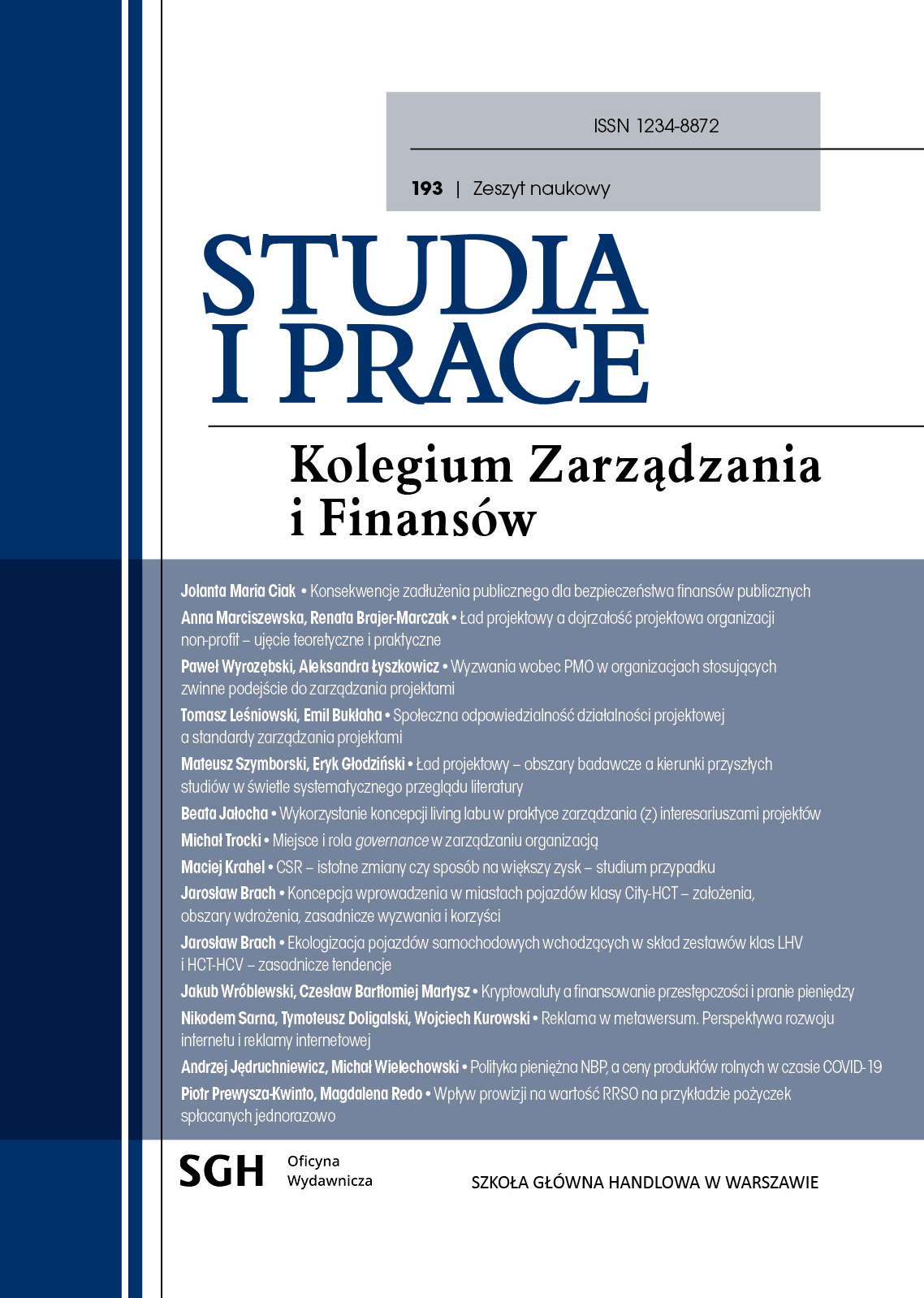CSR – significant change or a way to make more profit – a case study
DOI:
https://doi.org/10.33119/SIP.2023.193.8Keywords:
CSR, ethical companies, share value, LEGO, corporate social responsibilityAbstract
The literature indicates that corporate social responsibility (CSR) positively stimulates the activities of businesses around the world. This approach should result in better use of resources, care for the planet and equal treatment of employees and business partners. The approach can also generate additional profits and increased shareholder value. The article uses a case study method to try to answer the research questions posed: if LEGO’s company values are followed by the company in its daily work. Also presented is the relationship between CSR-compliant actions taken and the stock price of companies that are considered ethical and acting ecologically. The results presented are not conclusive, but may indicate that companies are using CSR not only to look after the welfare of the planet and employees, but also to make profits. The area of abuse of CSR to increase the value of companies is not sufficiently described in the literature, which motivated the author to take up this topic.
Downloads
References
University of Baltimore School of Law, „Journal of Media Law & Ethics”, vol. 5 (3/4), s. 38.
2. Adamska-Chudzińska M. [2014], Konkurencyjność przedsiębiorstwa oparta na wartości relacji z interesariuszami, „Nierówności Społeczne a Wzrost Gospodarczy”, nr 37 (1), s. 297.
3. Barney J. [1991], Frim resources and sustained competetive advantage, „Journal of Management”, vol. 17 (1), s. 99–110.
4. Buhmann K. [2011], Integrating human rights in emerging regulation of corporate social responsibility: The EU case, „International Journal of Law in Context”, vol. 7 (2), s. 139–179.
5. Carroll A. B. [2021], Corporate social responsibility: Perspectives on the CSR construct’s development and future, „Business & Society. Sage Journals”, vol. 60 (6), s. 48.
6. Chybrowski C., Kubacka M. [2021], Gra na giełdzie, Wydawnictwo Naukowe PWN, Warszawa, s. 72–76.
7. Harrison H., Kacperczyk M. [2009], Thre price of sin: The effects of social norms on markets, „Journal of Financial Economics”, vol. 93, s. 15–36.
8. Huang K., Sim N., Hong Z, Zhao H. [2020], Corporate social responsibility, corporate financial performance and the confounding effects of economic fluctuations: A meta-analysis, International Review of Financial Analysis, Elsevier, s. 17.
9. Ibrahim M. N., Kimbu A. N., Ribeiro M. A. [2023], Recontextualising the determinants of external CSR in the services industry: A cross-cultural study, Elsevier, s. 1.
10. Kaźmierczak M. [2019], Determinanty zarządzania społecznie odpowiedzialnego w sektorze małych i średnich przedsiębiorstw, Wydawnictwo Uniwersytetu Ekonomicznego w Poznaniu, s. 5.
11. Kiełbasa Ł., Szatkowski B., Wejman M. [2017], Wpływ zmianowego systemu pracy na bezpieczeństwo i zdrowie pracownika – zagrożenie czy normalne zjawisko? „Zeszyty Naukowe Politechniki Poznańskiej”, nr 72, s. 101.
12. Kozłowski M. [2016], Employer branding. Budowanie wizerunku pracodawcy krok po kroku, Wolters Kluwer Polska, s. 47–48, 74.
13. Lu J., Ren L., Zhang C., Rong D., Ahmed R. R., Streimikis J. [2020], Modified Carroll’s pyramid of corporate social responsibility to enhance organizational performance of SMEs industry, „Journal of Cleaner Production”, vol. 271.
14. Luo H. A., Balvers R. J. [2017], Social Screens and Systematic Investor Boycott Risk, „Journal of Financial and Quantitative Analysis”, vol. 52 (1), s. 365–399.
15. Malesky E., Taussig M. [2019], Participation, government legitimacy, and regulatory compliance in emerging economies: a firm-level field experiment in Vietnam, „American Political Science Review”, vol. 113 (2), s. 530–551.
16. Matten D., Moon J. [2020], Reflections on the 2018 decade award: The meaning and dynamics of corporate social responsibility, „The Academy of Management Review”, vol. 45 (1), s. 7–28.
17. Osuji O. K. [2015], Corporate social responsibility, juridification and globalisation: ‘inventive interventionism’ for a ‘paradox’, „International Journal of Law in Context”, vol. 11 (3), s. 265–298.
18. Rank S., Contreras F. [2021], Do millennials pay attention to corporate social responsibility in comparison to previous generations? Are they motivated to lead in times of transformation? A qualitative review of generations, CSR and work motivation, „International Journal of Corporate Social Responsibility”, vol. 6 (1), s. 4.
19. Rojek-Nowosielska M. [2019], Definicja CSR Według Normy ISO 26000 a praktyka gospodarcza, „Ruch Prawniczy, Ekonomiczny i Socjologiczny”, z. 3, s. 213.
20. Schein E. H. [1985], Organizational Culture and Leadership, Jossey – Bass Publishers, San Francisco, s. 595–599.
21. Situ H., Tilt C. A., Seet P. S. [2018], The influence of the government on corporate environmental reporting in China: an authoritarian capitalism perspective, Business & Society, s. 6.
22. Trollman H., Colwill J. [2021], The imperative of embedding sustainability in business: A model for transformational sustainable development, Sustainable development.
23. Windsor D. [2021], Political and ethical challenges of 2025: Utopian and dystopian views, w: Park S. H., Gonzalez-Perez M. A., Floriani D. (red.), The Palgrave Handbook of Corporate Sustainability in the Digital Era, Palgrave Macmillan, s. 13–236.
24. Wojciechowska R. [2014], Zachowanie etyczne a problem efektywności w ekonomii, Oficyna Wydawnicza SGH, Warszawa, s. 234.
25. Zhang D., Lucey B. M. [2022], Sustainable behaviors and firm performance: The role of financial constraints’ allevation, „Economic Analysis and Policy”, vol. 74, s. 220–233.
Artykuł prasowe i okolicznościowe
1. Dhue S., Epperson S. [2022], Most workers want their employer to share their values – 56%won’t even consider a workplace that doesn’t, survey finds, CNBC, New York, s. 2.
2. Krukowska M. [2014], 10 najbardziej odpowiedzialnych firm na świecie, Forbes, s. 1–5.
3. Kuraszko I., Panek-Owsiańska M., Rok B., Zadrożna K. [2007], CSR w firmie – zysk dzięki odpowiedzialności, Forbes, s. 8.
4. Palumbo J. [2022], Why The Lego Foundation Wants to improve early education worlwide, Forbes, s. 1.
Źródła internetowe
1. The 2023 World’s Most Ethical Companies® Honoree List [2023], World’s Most Ethical Companies Ethisphere, https://worldsmostethicalcompanies.com/honorees/ (dostęp: 4.02.2023).
2. The LEGO® Brand, https://www.lego.com/en-us/aboutus/lego-group/the-lego-brand (dostęp: 20.04.2023).
3. World Wide Fund for Nature Polska, https://www.wwf.pl/aktualnosci/wakacje-w-morzu-plastiku-i-oceanie-toksyn (dostęp: 20.04.2023).
Downloads
Published
Versions
- 2024-03-20 (2)
- 2023-12-06 (1)









